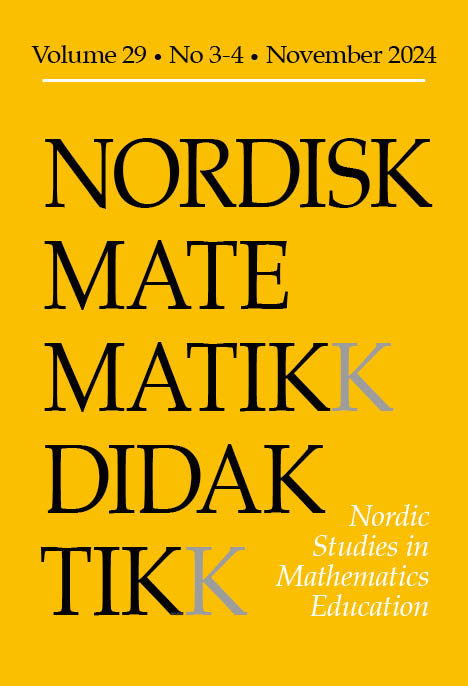Analyzing teachers’ narratives to identify potential impediments of professional development in mathematics
DOI:
https://doi.org/10.7146/nomad.v29i3-4.150754Keywords:
mathematics educationAbstract
This study explores two experienced teachers’ identifying narratives on teaching mathematics with problems in professional development. Data is from the Partners in practice project, which aims to support transition from traditional to progressive educational practices. The study investigates narratives of these teachers and how they align with dominant discourses of teaching in the field. Analysis suggests that both teachers are squeezed between their specific pedagogical discourses and more official pedagogical Discourses. Secondly, there is an unclear connection between the teachers’ discourses as learners and as teachers of mathematics.
References
Bell, C. A., Wilson, S. M., Higgins, T. & McCoach, D. B. (2010). Measuring the effects of professional development on teacher knowledge: the case of developing mathematical ideas. Journal for Research in Mathematics Education, 41 (5), 479–512. https://doi.org/10.5951/jresematheduc.41.5.0479
Blei, D. M., Ng, A. Y. & Jordan, M. I. (2003). Latent Dirichlet allocation. Journal of Machine Learning Research, 3 (Jan), 993–1022.
Calleja, J. (2022). Changes in mathematics teachers’ self-reported beliefs and practices over the course of a blended continuing professional development programme. Mathematics Education Research Journal, 34 (4), 835–861. https://doi.org/10.1007/s13394-021-00366-x
Dash, S., Kramer, R. M. de, O’Dwyer, L. M., Masters, J. & Russell, M. (2012). Impact of online professional development on teacher quality and student achievement in fifth grade mathematics. Journal of Research on Technology in Education, 45 (1), 1–26. https://doi.org/10.1080/15391523.2012.10782595
Dewey, J. (1938). Experience and education. Kappa Delta Pi/Touchstone.
Gage, N. L. (2009). A conception of teaching. Springer.
Gee, J. P. (2001). Identity as an analytic lens for research in education. Review of Research in Education, 25, 99–125. https://doi.org/10.2307/1167322
Gee, J. P. (2014). How to do discourse analysis – a toolkit (2nd ed.). Routledge.
Gee, D. & Whaley, J. (2016). Learning together: practice-centred professional development to enhance mathematics instruction. Mathematics Teacher Education and Development, 18 (1), 87–99.
Graven, M. & Heyd-Metzuyanim, E. (2019). Mathematics identity research: the state of the art and future directions. ZDM, 51 (3), 361–377. https://doi.org/10.1007/s11858-019-01050-y
Heyd-Metzuyanim, E. & Shabtay, G. (2019). Narratives of ”good” instruction: teachers’ identities as drawing on exploration vs. acquisition pedagogical. discourses. ZDM, 51 (3), 541–554. https://doi.org/10.1007/s11858-018-01019-3
Hill, H. C. (2011). The nature and effects of middle school mathematics teacher learning experiences. Teachers College Record, 113 (1), 205–234. https://doi.org/10.1177/016146811111300106
Holland, D., Lachicotte, W., Skinner, D. & Cain, C. (1998). Identity and agency in cultural worlds. Harvard University Press.
Hsieh, H. F. & Shannon, S. E. (2005). Three approaches to qualitative content analysis. Qualitative Health Research, 15 (9), 1277–1288. https://doi.org/10.1177/1049732305276687
Kazemi, E. & Hintz, A. (2014). Intentional talk: how to structure and lead productive mathematical discussions. Stenhouse Publishers.
Lutovac, S. & Kaasila, R. (2018). Future directions in research on mathematics-related teacher identity. International Journal of Science and Mathematics Education, 16, 759–776. https://doi.org/10.1007/s10763-017-9796-4
Lutovac, S. & Kaasila, R. (2019). Methodological landscape in research on teacher identity in mathematics education: a review. ZDM, 51 (3), 505–515. https://doi.org/10.1007/s11858-018-1009-2
Sfard, A. (2016). Ritual for ritual, exploration for exploration: or what learners are offered is what you get from them in return. In J. Adler & A. Sfard (Eds.), Research for educational change (pp. 41–63). Elsevier.
Sfard, A. (2019). Making sense of identities as sense-making devices. ZDM, 51 (3), 555–564. https://doi.org/10.1007/s11858-019-01058-4
Sfard, A. & Prusak, A. (2005). Telling identities: in search of an analytic tool for investigating learning as a culturally shaped activity. Educational Researcher, 34 (4), 14–22. https://doi.org/10.3102/0013189X034004014
Skott, J. (2019). Changing experiences of being, becoming, and belonging: teachers’ professional identity revisited. ZDM, 51 (3), 469–480. https://doi.org/10.1007/s11858-018-1008-3
Wenger, E. (1998). Communities of practice: learning, meaning and identity. Cambridge University Press.
Zhang, Y. & Wang, P. (2021). Twenty years’ development of teacher identity research: a bibliometric analysis. Frontiers in Psychology, 12, 783913. https://doi.org/10.3389/fpsyg.2021.783913
Downloads
Published
How to Cite
Issue
Section
License

This work is licensed under a Creative Commons Attribution-NonCommercial-ShareAlike 4.0 International License.



